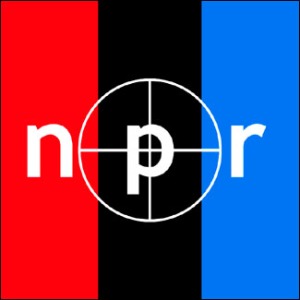by Symi Rom-Rymer
It’s practically impossible for a news organization, especially one like NPR, that is considered left-of-center, to cover the Middle East conflict and not to be accused, by someone, of being anti-Israel. A quick Google search shows that people across the spectrum have taken issue with NPR and its coverage of the Israeli-Palestinian conflict. In 2000, CAMERA (The Committee for Accuracy in Middle East Reporting in America), a conservative pro-Israel media watchdog group, called the station’s coverage of Israel hostile, adding that it presented Israel as “morally reprehensible.” In May of this year, it criticized the Diane Rehm Show, saying that Rehm “stacked the deck against Israel” in a segment. Of course, it’s not only pro-Israel advocates who take issue with NPR’s Middle East reporting. In 2001, FAIR (Fairness and Accuracy in Reporting), a liberal media watchdog group, quoted Arab-American media critic Ali Abuminah saying that NPR’s coverage of Israeli attacks on Palestinians was, “cursory, inconsistent and wholly inadequate.”
NPR is no stranger to controversy. In the past year alone, it has been excoriated for firing Juan Williams and for remarks made by the now-former NPR executive Ron Schiller about the Tea Party. Congress, pushed by conservative Republican representatives, recently debated a bill that would eliminate government funding for its programming. All this contention has not escaped the notice of NPR hosts and reporters. In March, on the NPR show “On the Media,” host Brooke Gladstone and Ira Glass, of “This American Life,” looked at the charges of liberal bias leveled against NPR by conservative lawmakers and commentators. They broke down certain segments and discussed, with input from self-defined conservative listeners, instances of suspected liberal favoritism.
In addition, Gladstone interviewed three different media analysts who had conducted studies on bias in the news. According Steve Rendal from FAIR, NPR did in fact have a bias: a conservative one. Tim Groseclose, a professor in the Economics and Political Science Department at UCLA, and Jeff Milyo, an economics professor at the University of Missouri, carried out their own study which showed that NPR did, in fact, have a liberal bias, but so did 18 out of the 20 media outlets it evaluated, including The Wall Street Journal. Finally, Gladstone interviewed Tom Rosenstiel, of the Project for Excellence in Journalism, part of the Pew Research Center. He found that NPR’s coverage was as neutral as or more conservative than other major American news outlets. The results, in other words, were inconclusive.
Although we might think of ideal journalism as a purely objective reporting of the facts, that is simply not the reality. Each individual reporter has his or her own biases, and so does each news organization. It’s impossible not to. These biases come not only from how we see the world as adults but from our experiences growing up. Our ethnic and socio-economic backgrounds, our families, our friends, our education–formal and informal–all inform how we see the world.
How each media outlet chooses to handle that subjective reality, however, is a different matter. Seven years ago, NPR, perhaps in response to criticism it received from Jewish and Arab groups, asked John Felton, foreign editor at NPR and former foreign affairs reporter for Congressional Quarterly, to compile annual quarterly reports assessing NPR’s Middle East coverage. Each report breaks down the coverage into various catagories, including Accuracy, Fairness and Balance, and Voices. One of the most interesting findings in his reports is that while the critics on both sides seems to think that NPR’s coverage is too extreme on one side or the other, Felton feels that NPR does not push the envelope enough. In several reports he mentions that the commentators and analysts invited on various shows represent the milder opinions on the conflict and that a lack of radical views offers a limited picture of the mindset of many in the region.
In the “On the Media” piece, one of Gladstone’s conservative listeners commented that he didn’t so much oppose certain stories themselves, but rather took issue with the tone that was used, especially by some of the journalists. It wasn’t something concrete that he could point to, but rather a general feeling. As Felton points out in his reports, NPR, like many news outlets, occasionally makes mistakes in its coverage. Sometimes it misquotes a casualty figure or poorly translates an interviewee or misrepresents a situation. But on the whole, these actual errors are few. CAMERA, Abuminah, and others are, like Gladstone’s listener, likely reacting to an emotional feeling they get when comparing the broadcasts to their very particular point of view rather than to an objective shortcoming. For them, NPR may never get it right. But at least they’re trying.

5 thoughts on “Is NPR Anti-Israel?”
Symi – I am so happy that you wrote about this issue.
Having been an avid and contributing listener to NPR for years, I became dissatisfied with their reporting on Israel and stopped contributing, I also wrote to them about it. You are right on in their reporting of Middle East news and subjective views. Yes, “they may be trying”, but to me that just isn’t good enough.
How many of the other media outlets NPR was compared to are funded by tax dollars?
Listening to the numerous factual errors and obvious anti-Israel bias on NPR concerning the Israel/Palestine issue makes me wonder about NPR’s coverage of other issues, where I am not as well informed. I now no longer trust NPR’s coverage of China, Latin America or European issues.
There is an undeniable slant in favor of the so called Palestinians. No report on Israel, even a report on a beauty pageant has a PAL slant. They are not the same country and Israel is not responsible them for anything. But NPR can’t do even a light weight story on Israel without turning it into an indictment.